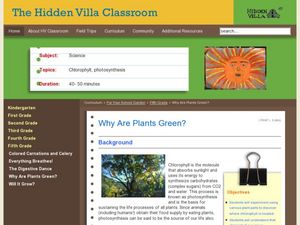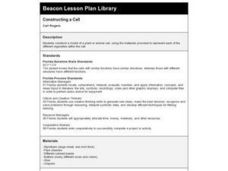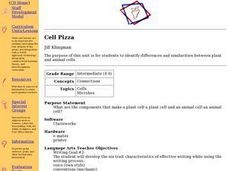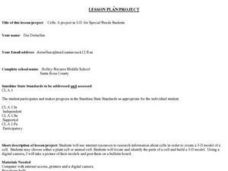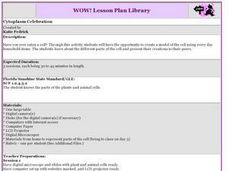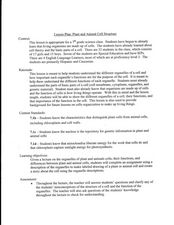Curated OER
Cell Structures and Their Functions
Life science learners investigate live cells. They examine wet mount slides of cyanobacteria and Elodea plants. They peer into the dynamic microscopic world of protists. Afterward, they construct a model of a cell, including rudimentary...
Curated OER
Plant and Animal Cells
Students investigate parts of a cell. In this plant cell lesson, students determine the difference between plant and animal cells. Students discover that coral is an animal based on cell characteristics. Students create puppets to...
Curated OER
THE CELL: DESIGN AND FUNCTION
After studying the structure and functions of living cells using textbooks, internet or encyclopedias, students prepare a PowerPoint presentation on cell structure and present it to the class.
Curated OER
Plant and Animal Cells: Alike and Different?
Seventh graders create a mneumonic device and a graphic organizer about the parts of plant and animal cells. In this biology lesson plan students are introduced to the parts of the cells and then work in groups to create projects that...
Curated OER
Why Are Plants Green?
Students smash plant parts and wait for visibility of chlorophyl to show why plants turn green. In this green plants lesson plan, students use acetone and filter paper for this experiment.
Curated OER
Cells, Cells, Cells
Students explore plant and animal cells. Using household items, students create a three-dimensional model of a plant or animal cell. Students identify and label each cell part.
Curated OER
Cell-O
Young scholars create model cells using gelatin, toothpicks, and various fruits to represent organelles. Then, students observe their models and complete a Venn Diagram comparing and contrasting plant and animal cells.
Curated OER
How to: Build a Plant Cell
Students build a 3-dimensional model of a plant cell with household objects. In this plant biology lesson, students construct replica plant cells in groups of three. After completing their projects, students share their creations with...
Curated OER
Cells
Students research both plant and animal cell characteristics. They draw the parts of each cell and as groups present their research.
Curated OER
Parts of the Flower and Pollination
Students review the parts of the plant and recognize the parts that are important for pollination. For this pollination lesson, students illustrate and label the parts of a flower. Students compare different types of flowers.
Curated OER
Constructing a Cell
Third graders, in groups, make a model of a plant or animal cells and represent each of the organelles in the cell.
Curated OER
Journey to the Center of a Cell
Ninth graders create a large scale model of a eukaryotic cell. In this biology lesson, 9th graders identify the different parts and function of the cells by using a robot to navigate through the cell models. They create a video tutorial...
Curated OER
MAKING THREE DIMENSIONAL PLANT AND ANIMAL CELLS
Young scholars create two different cells, one plant and one animal. In this plant and animal cell instructional activity students form groups and construct a part of a cell. Young scholars then put them all together to form one...
Curated OER
Cell Pizza
Students identify parts and functions of microscope. Students watch video, Cells and Life about cell parts with actual pictures and actual cells. Students discuss video and identify parts of the cells that animals and plants have in...
Curated OER
Lesson 2: the Cell Cycle
Students explain how cells reproduce. In this biology lesson, students explain the different stages of the cell cycle. They calculate the number of new cells produced.
Curated OER
Cells: A project in 3-D for Special Needs Students
Students use the internet to research information about cells in order to create a 3-D model of a cell. They may choose either to research a plant or animal cell. Students locate and identify the parts of a cell and build a 3-D mode.
Curated OER
Cellular Models
Each student construct a model of a cell on a large cookie, including the parts which were discussed during lecture.? Half of the class will be instructed to make plant cell models and the other half will be in charge of animal cell...
Curated OER
Cells are 3-D!
Students design three dimensional models of plant and animal cells. They identify the cells parts, and compare animal and plant cells.
Curated OER
Hands-on Cells
Students review the components of a cell and the differences between plant and animal cells by creating a three-dimensional model of each type of cell. In small groups, they use modeling clay and household object to construct their models.
Curated OER
Coral Polyp Party
Learners complete a project where they label the parts of a coral polyp and discuss the differences between plants and animals. Students use marshmallows, sprinkles, toothpicks, and more to label their coral polyp.
Curated OER
Cell Reviews
High schoolers draw cells, make a cell, and list organelles in plant and animal cells. In this cells lesson plan, students create edible cells.
Curated OER
Cytoplasm Celebration
Students create a model of a cell using everyday household items. They view digital microscope images of cells and cell parts, watch an online video, create a cell model out of household images, and record their presentation using a...
Curated OER
Plant and Animal Cell Structure
Seventh graders identify the different parts and functions of the cell. In this biology instructional activity, 7th graders make a labelled diagram of either a plant or animal cell. They write a story about it.
Curated OER
The Way a Tree Works
Students explore nature by conducting botany experiments. In this plant life lesson plan, students define the necessary resources for a plant to thrive on our planet while defining scientific vocabulary terms. Students utilize different...




